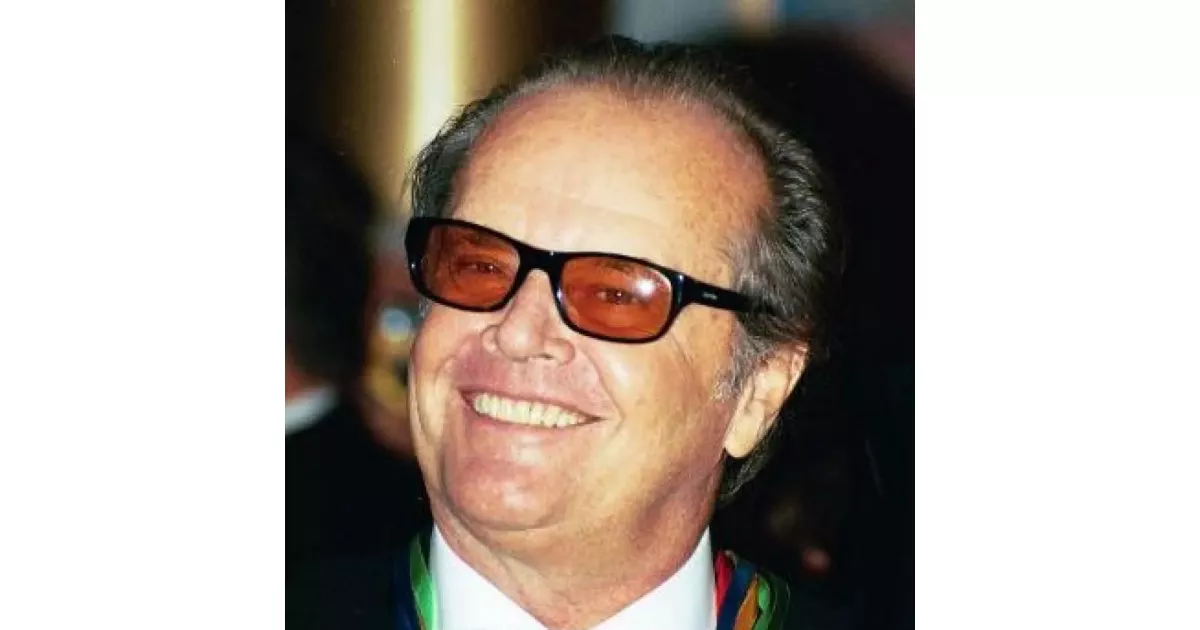Jack Nicholson is a highly acclaimed and now-retired American actor and filmmaker, celebrated for his portrayals of rebellious characters. His career spanned five decades, during which he earned widespread recognition as one of the greatest actors of the 20th century. He has received numerous awards, including three Academy Awards, three British Academy Film Awards, six Golden Globe Awards, and a Grammy Award, solidifying his legacy in the film industry.
1909: Birth of Donald Rose (Furcillo)
In 1909, Donald Furcillo (stage name Donald Rose), who married June Frances Nicholson in 1936, was born. He was an Italian-American showman.
1918: Birth of June Frances Nicholson
In 1918, June Frances Nicholson, Jack Nicholson's mother, was born. She was a showgirl and used the stage name June Nilson.
1936: Marriage of June Frances Nicholson and Donald Furcillo
In 1936, June Frances Nicholson married Italian-American showman Donald Furcillo (stage name Donald Rose), before discovering he was already married.
April 22, 1937: John Joseph Nicholson Born
On April 22, 1937, John Joseph Nicholson was born in Neptune City, New Jersey. He later became a celebrated actor and filmmaker known for his rebellious roles.
1950: Moved to California
In 1950, at the age of 13, Nicholson first came to California and took a job as an office worker for animation directors William Hanna and Joseph Barbera at the MGM cartoon studio.
1954: Voted Class Clown
In 1954, Jack Nicholson, known as 'Nick' to his high school friends, was voted 'Class Clown' by the Class of 1954 at Manasquan High School. He was in detention every day for a whole school year.
May 5, 1955: First Day as a Working Actor
On May 5, 1955, Nicholson had his first day as a working actor on "Tales of Wells Fargo", a date he considered lucky because 5 was the jersey number of his boyhood idol, Joe DiMaggio.
1957: Joined California Air National Guard
In 1957, Nicholson joined the California Air National Guard, a move he sometimes characterized as an effort to 'dodge the draft'.
1958: Film Debut in The Cry Baby Killer
In 1958, Nicholson made his film debut in the low-budget teen drama "The Cry Baby Killer", playing the title role.
1960: Starred in The Wild Ride
In 1960, Nicholson starred as a rebellious dirt-track race driver in the film "The Wild Ride".
1961: Called up for Extended Active Duty
During the Berlin Crisis of 1961, Nicholson was called up for several months of extended active duty with the California Air National Guard.
1962: Nicholson marries Sandra Knight
In 1962, Jack Nicholson married Sandra Knight, his co-star in the movie "The Terror".
1962: Discharge from Air National Guard
In 1962, Nicholson was discharged from the California Air National Guard at the end of his enlistment.
September 13, 1963: Nicholson's daughter Jennifer born
On September 13, 1963, Jack Nicholson's daughter, Jennifer, was born to him and his then-wife, Sandra Knight.
1963: Death of Mother
In 1963, Jack Nicholson's mother passed away before he discovered she was actually his mother.
1963: Death of June Frances Nicholson
In 1963, June Frances Nicholson, Jack Nicholson's mother, passed away.
1966: Nicholson and Sandra Knight separate
In 1966, Jack Nicholson and Sandra Knight separated, though their divorce was not finalized until 1968.
1967: Screenplay for The Trip
In 1967, Nicholson wrote the screenplay for the counterculture film "The Trip", directed by Roger Corman, starring Peter Fonda and Dennis Hopper, marking his first real taste of writing success.
1968: Nicholson's divorce from Sandra Knight
In 1968, Jack Nicholson's marriage to Sandra Knight officially ended after they had separated in 1966.
1969: Oscar Nomination for Easy Rider
In 1969, Nicholson received an Oscar nomination for his role in "Easy Rider", marking a significant milestone in his career.
1969: Role in Easy Rider
In 1969, Nicholson's big acting break came with the role of alcoholic lawyer George Hanson in "Easy Rider", earning him his first Oscar nomination and elevating him to a counter-culture hero.
September 26, 1970: Susan Anspach's son Caleb born
On September 26, 1970, Susan Anspach gave birth to a son named Caleb, whose legal father was Mark Goddard. Anspach claimed that Jack Nicholson was Caleb's biological father.
1970: Nicholson becomes a Lakers season ticket holder
In 1970, Jack Nicholson became a season ticket holder for the Los Angeles Lakers, securing courtside seats at both The Forum and Staples Center.
1970: Death of Grandmother
In 1970, Jack Nicholson's grandmother passed away before he discovered his true parentage.
1970: Appearance in On a Clear Day You Can See Forever
In 1970, Nicholson appeared in the film adaptation of "On a Clear Day You Can See Forever", although most of his performance was cut.
1970: Oscar Nomination for Five Easy Pieces
In 1970, Nicholson received an Oscar nomination for his performance in "Five Easy Pieces", further establishing his reputation as a talented actor.
1970: Starred in Five Easy Pieces
In 1970, Nicholson starred in "Five Easy Pieces" alongside Karen Black, a role that defined his persona. Both Nicholson and Black were nominated for Academy Awards for their performances.
1971: Nicholson's relationship with Michelle Phillips begins
In 1971, Jack Nicholson began a relationship with singer Michelle Phillips, who was previously married to his friend Dennis Hopper. During their relationship, Phillips suffered a miscarriage.
1971: Role in Carnal Knowledge
In 1971, Nicholson played a notable role in "Carnal Knowledge", a comedy-drama directed by Mike Nichols.
1972: Nicholson continues relationship with Michelle Phillips
In 1972, Jack Nicholson continued his relationship with singer Michelle Phillips. The relationship ultimately ended after about a year.
1972: Presented Academy Award for Best Picture
In 1972, Jack Nicholson presented the Academy Award for Best Picture.
1972: Nicholson supports George McGovern
In 1972, Jack Nicholson supported George McGovern in the presidential election, aligning himself with the Democratic candidate.
1973: Nicholson's relationship with Anjelica Huston begins
In 1973, Jack Nicholson began his longest relationship with actress Anjelica Huston, which would last until 1990.
1973: Starred in The Last Detail
In 1973, Nicholson starred in Hal Ashby's "The Last Detail", alongside Randy Quaid, for which he won Best Actor at the Cannes Film Festival and received nominations for an Oscar and a Golden Globe.
1974: Oscar Nominations for The Last Detail and Chinatown
In 1974, Nicholson received Oscar nominations for his performances in "The Last Detail" and "Chinatown", showcasing his versatility as an actor.
1974: Starred in Chinatown
In 1974, Nicholson starred in Roman Polanski's noir thriller "Chinatown", receiving another Academy Award nomination for his role as Jake Gittes.
1974: Discovery of True Parentage
In 1974, Time magazine researchers informed Nicholson that his 'sister,' June, was actually his mother, and his other 'sister,' Lorraine, was really his aunt.
1975: Starred in 'The Passenger'
In 1975, Jack Nicholson also starred in Michelangelo Antonioni's 'The Passenger', playing journalist David Locke who assumes a dead man's identity, only to find that he was a weapons smuggler. Nicholson thought so highly of the film that he bought the world rights and recorded a reminiscence of working with Antonioni.
1975: Starred in 'One Flew Over the Cuckoo's Nest'
In 1975, Jack Nicholson starred as Randle P. McMurphy in 'One Flew Over the Cuckoo's Nest', a film adaptation of Ken Kesey's novel. Nicholson played an anti-authoritarian patient in a mental hospital, becoming an inspiring leader. The role earned him his first Academy Award for Best Actor.
1975: Academy Award for One Flew Over the Cuckoo's Nest
In 1975, Nicholson won the Academy Award for Best Actor for his role as Randle McMurphy in the film "One Flew Over the Cuckoo's Nest".
1976: Starred in 'The Missouri Breaks'
In 1976, Jack Nicholson took a less sympathetic role in Arthur Penn's western 'The Missouri Breaks' specifically to work with Marlon Brando. Nicholson was inspired by Brando's acting ability, having idolized him since his youth.
1977: Presented Academy Award for Best Picture
In 1977, Jack Nicholson presented the Academy Award for Best Picture.
1977: Arrest of Roman Polanski at Nicholson's Home
In 1977, Roman Polanski was arrested at Nicholson's home for the sexual assault of 13-year-old Samantha Geimer. Nicholson was out of town at the time.
1978: Presented Academy Award for Best Picture
In 1978, Jack Nicholson presented the Academy Award for Best Picture.
1978: Direction of Goin' South
In 1978, Nicholson directed the film "Goin' South", marking one of his directorial efforts.
1980: Starred in 'The Shining'
In 1980, Jack Nicholson starred as writer Jack Torrance in Stanley Kubrick's adaptation of Stephen King's 'The Shining'. Nicholson drew upon his own experiences as a writer and slept short hours to remain in an agitated state for the role. He improvised the famous "Here's Johnny!" line.
1981: Nicholson in Reds
In 1981, Jack Nicholson played Eugene O'Neill in the film Reds, and identified with his Irish heritage.
1981: Starred in 'The Postman Always Rings Twice' and 'Reds'
In 1981, Jack Nicholson starred in 'The Postman Always Rings Twice' and 'Reds', where he portrayed writer Eugene O'Neill.
1981: Oscar Nomination for Reds
In 1981, Nicholson received an Oscar nomination for his role in the film "Reds".
January 26, 1982: Nicholson's daughter Honey Hollman born
On January 26, 1982, Jack Nicholson's daughter, Honey Hollman, was born to Danish model Winnie Hollman.
1982: Starred in 'The Border'
In 1982, Jack Nicholson starred in 'The Border' as an immigration enforcement agent directed by Tony Richardson. He was instructed to portray his role less expressively than in previous roles and to wear reflecting sunglasses.
1983: Won Oscar for 'Terms of Endearment'
In 1983, Jack Nicholson won his second Oscar, an Academy Award for Best Supporting Actor, for his role as retired astronaut Garrett Breedlove in 'Terms of Endearment'. His scenes with Shirley MacLaine were particularly noted for giving the film its "buoyant edge".
1983: Academy Award for Terms of Endearment
In 1983, Nicholson won the Academy Award for Best Supporting Actor for playing an aging playboy in the film "Terms of Endearment".
1984: Nicholson questions paternity of Caleb
In 1984, Jack Nicholson expressed doubt regarding Susan Anspach's claim that he was the biological father of her son, Caleb.
1985: Starred in 'Prizzi's Honor'
In 1985, Jack Nicholson starred in 'Prizzi's Honor', directed by John Huston. Huston praised Nicholson's performance, stating that he illuminated the book.
1985: Oscar Nomination for Prizzi's Honor
In 1985, Nicholson received an Oscar nomination for his performance in "Prizzi's Honor".
1986: Starred in 'Heartburn'
In 1986, Jack Nicholson starred in 'Heartburn'.
1987: Starred in 'The Witches of Eastwick', 'Broadcast News', and 'Ironweed'
In 1987, Jack Nicholson starred in 'The Witches of Eastwick', 'Broadcast News', and 'Ironweed'. He received Oscar nominations for 'Ironweed'.
1987: Role in Broadcast News
In 1987, Nicholson played a notable role in "Broadcast News", a romantic comedy-drama film.
1987: Oscar Nomination for Ironweed
In 1987, Nicholson received an Oscar nomination for his role in "Ironweed", adding to his list of critically acclaimed performances.
1988: Nicholson supports Michael Dukakis
In 1988, Jack Nicholson voiced his support for Michael Dukakis in the presidential election.
1989: Played the Joker in 'Batman'
In 1989, Jack Nicholson played the Joker in the 'Batman' movie. The film was a smash hit and earned him an estimated $60 to $90 million from a percentage of the box office gross. Nicholson stated that he was "particularly proud" of his performance and considered it a piece of pop art.
1989: Role in Batman
In 1989, Nicholson played a notable role in "Batman", a superhero film directed by Tim Burton.
April 16, 1990: Nicholson's daughter Lorraine born
On April 16, 1990, Jack Nicholson's daughter, Lorraine, was born to him and Rebecca Broussard.
1990: Presented Academy Award for Best Picture
In 1990, Jack Nicholson presented the Academy Award for Best Picture.
1990: Nicholson's relationship with Anjelica Huston ends
In 1990, Jack Nicholson's on-again, off-again relationship with Anjelica Huston ended, amidst news of Rebecca Broussard's pregnancy with Nicholson's child.
1990: Direction of The Two Jakes
In 1990, Nicholson directed the film "The Two Jakes", adding to his directorial credits.
February 20, 1992: Nicholson's son Raymond born
On February 20, 1992, Jack Nicholson's son, Raymond, was born to him and Rebecca Broussard.
1992: Nominated for Academy Award for 'A Few Good Men'
In 1992, Jack Nicholson received another Academy Award nomination for Best Supporting Actor for his role as Col. Nathan R. Jessup in 'A Few Good Men'. His performance was described as "spellbinding" and portraying "the essence of the quintessential military mindset".
1992: Nominated for Razzie Awards for 'Man Trouble' and 'Hoffa'
In 1992, Jack Nicholson was nominated for Razzie Awards as worst actor for 'Man Trouble' and 'Hoffa'. However, his performance in Hoffa also earned him a Golden Globe nomination.
1992: Role in Hoffa
In 1992, Nicholson played a notable role in "Hoffa", a biographical crime drama film.
1992: Oscar Nomination for A Few Good Men
In 1992, Nicholson received an Oscar nomination for his performance in "A Few Good Men".
1992: Nicholson discusses faith
In a 1992 Vanity Fair interview, Jack Nicholson stated that he no longer believes in God, but envies those who have faith and find it soothing.
1993: Presented Academy Award for Best Picture
In 1993, Jack Nicholson presented the Academy Award for Best Picture.
February 8, 1994: Nicholson involved in road rage incident
On February 8, 1994, Jack Nicholson allegedly attacked Robert Blank's Mercedes-Benz with a golf club after a traffic dispute in North Hollywood. Charges were later dropped after Nicholson apologized and reached a settlement.
August 15, 1994: Nicholson reportedly has a daughter Tessa
On August 15, 1994, Jack Nicholson reportedly had a daughter, Tessa, with waitress Jeannine Gourin; however, he has never publicly acknowledged her as his child.
1994: AFI Life Achievement Award
In 1994, Nicholson was honored with the AFI Life Achievement Award, recognizing his significant contributions to cinema.
1995: Ruscha comments on Nicholson's art collection
In 1995, artist Edward Ruscha commented that Jack Nicholson has "one of the best collections out here" referring to his collection of 20th-century and contemporary paintings.
1996: Caleb claims Nicholson acknowledged him as his son
In 1996, Caleb Anspach stated that Jack Nicholson had privately acknowledged him as his son.
1996: Starred in 'Mars Attacks!'
In 1996, Jack Nicholson collaborated with Tim Burton on 'Mars Attacks!', playing two characters: President James Dale and Art Land.
1996: Lawsuit alleging assault filed against Nicholson
In 1996, a lawsuit was filed against Jack Nicholson by Catherine Sheehan, alleging assault after a dispute over payment for sex. Sheehan received a settlement, but the case was eventually dismissed.
1997: Death of Donald Rose (Furcillo)
In 1997, Donald Furcillo (stage name Donald Rose), who married June Frances Nicholson, passed away.
1997: Won Academy Award for 'As Good as It Gets'
In 1997, Jack Nicholson won his Academy Award for Best Actor in 'As Good as It Gets', playing Melvin Udall, a novelist with obsessive-compulsive disorder. The film was a box-office success, grossing $314 million.
1998: Nicholson publicly acknowledges Caleb as his son
In 1998, Jack Nicholson publicly acknowledged Caleb Anspach as his son and stated that they had a good relationship.
1999: Cecil B. DeMille Award
In 1999, Nicholson received the Cecil B. DeMille Award, celebrating his outstanding achievements in the entertainment industry.
1999: Honey Hollman's biological father revealed to be Lou Adler
In 1999, it was discovered that producer Lou Adler is the biological father of Honey Hollman, though she maintains a relationship with Jack Nicholson.
2000: Nicholson and Lara Flynn Boyle initially break up
In 2000, Jack Nicholson and actress Lara Flynn Boyle initially ended their relationship, later reuniting.
2001: Received Stanislavsky Award and starred in 'The Pledge'
In 2001, Jack Nicholson received the Stanislavsky Award at the 23rd Moscow International Film Festival. That same year, he starred in 'The Pledge', playing a retired police detective.
2001: Kennedy Center Honor
In 2001, Nicholson was awarded the Kennedy Center Honor, acknowledging his lifetime contributions to American culture through the performing arts.
2002: Starred in 'About Schmidt'
In 2002, Jack Nicholson acted in Alexander Payne's 'About Schmidt', playing a retired actuary. His performance earned him nominations for several awards.
2002: Oscar Nomination for About Schmidt
In 2002, Nicholson received an Oscar nomination for his role in "About Schmidt", continuing his streak of acclaimed performances.
May 2003: Nicholson almost ejected from Lakers game
In May 2003, Jack Nicholson nearly got ejected from a Lakers playoff game for yelling at a referee.
2003: Starred in 'Anger Management'
In 2003, Jack Nicholson played an aggressive therapist in 'Anger Management', alongside Adam Sandler.
2003: Starred in 'Something's Gotta Give'
In 2003, Jack Nicholson starred in 'Something's Gotta Give', a romantic comedy directed by Nancy Meyers, playing an aging playboy. He was nominated for a Golden Globe for his performance.
2003: Nicholson's friendship described in Kingdom of Fear
In 2003, Jack Nicholson's friendship with Hunter S. Thompson was described in Thompson's autobiography, Kingdom of Fear.

2003: Roles in Anger Management and Something's Gotta Give
In 2003, Nicholson played roles in both "Anger Management" and "Something's Gotta Give", showcasing his versatility in comedy and romantic comedy genres.
2004: Nicholson purchases Marlon Brando's bungalow
After Marlon Brando's death in 2004, Jack Nicholson purchased Brando's bungalow on Mulholland Drive for $6.1 million with plans to demolish it due to its derelict state and mold issues.
2004: Nicholson and Lara Flynn Boyle split permanently
In 2004, Jack Nicholson and Lara Flynn Boyle permanently ended their relationship. Afterwards, Nicholson was linked to Kate Moss.
2004: High School Reunion
In 2004, Nicholson attended his 50-year high school reunion accompanied by his aunt Lorraine.
2005: Nicholson attends Hunter S. Thompson's memorial service
After Hunter S. Thompson died in 2005, Jack Nicholson, along with Johnny Depp, John Cusack, and Sean Penn, attended Thompson's private memorial service in Colorado.
2006: Presented Academy Award for Best Picture
In 2006, Jack Nicholson presented the Academy Award for Best Picture.
2006: Starred in 'The Departed'
In 2006, Jack Nicholson starred in Martin Scorsese's 'The Departed', playing Frank Costello, a Boston Irish Mob boss. The role earned him critical praise and a Golden Globe nomination.
2006: Nicholson dates Paz de la Huerta
In 2006, Jack Nicholson was in a relationship with actress Paz de la Huerta.
2007: Co-starred in 'The Bucket List'
In 2007, Jack Nicholson co-starred with Morgan Freeman in Rob Reiner's 'The Bucket List', portraying a dying man fulfilling his goals. He researched the role by visiting a hospital.
2007: Presented Academy Award for Best Picture
In 2007, Jack Nicholson presented the Academy Award for Best Picture.
May 2008: Nicholson to be inducted into the California Hall of Fame
In May 2008, California Governor Arnold Schwarzenegger and First Lady Maria Shriver announced that Jack Nicholson would be inducted into the California Hall of Fame.
December 15, 2008: Nicholson inducted into the California Hall of Fame
On December 15, 2008, Jack Nicholson was inducted into the California Hall of Fame, alongside 11 other Californians, at a ceremony held at The California Museum in Sacramento.
2008: Nicholson supports Hillary Clinton
In 2008, Jack Nicholson supported Hillary Clinton in her bid for the presidency.
2010: Starred in 'How Do You Know'
In 2010, Jack Nicholson played a supporting role in the film 'How Do You Know'.
2010: Nicholson inducted into the New Jersey Hall of Fame
In 2010, Jack Nicholson was inducted into the New Jersey Hall of Fame, recognizing his contributions and achievements.
2010: Starring in How Do You Know and Retirement from Acting
In 2010, Nicholson starred in "How Do You Know" and subsequently retired from acting, marking the end of his on-screen performances.
2011: Nicholson receives honorary degree from Brown University
In 2011, Jack Nicholson received an honorary Doctor of Fine Arts degree from Brown University at its 243rd commencement ceremony. Brown University's president, Ruth Simmons, hailed him as "the most skilled actor of our lifetime".
September 2013: Indicated less drive to work
In September 2013, Jack Nicholson stated in a Vanity Fair article that he did not consider himself retired, but was less driven to "be out there anymore".
2013: Co-presented Academy Award for Best Picture
In 2013, Jack Nicholson co-presented the Academy Award for Best Picture with First Lady Michelle Obama, marking the eighth time he presented the award.
February 15, 2015: Appeared on SNL 40
On February 15, 2015, Jack Nicholson made a special appearance as a presenter on SNL 40, the 40th anniversary special of Saturday Night Live.
June 3, 2016: Interview about Muhammad Ali on HBO
On June 3, 2016, after the death of Muhammad Ali, Jack Nicholson appeared on HBO's 'The Fight Game with Jim Lampley' for an interview about his friendship with Ali.
2017: Toni Erdmann Remake Abandoned
In 2017, Jack Nicholson was reported to be starring in an English-language remake of Toni Erdmann opposite Kristen Wiig, but the project was later abandoned.
2018: Turned down role in 'Ready Player One'
In 2018, Jack Nicholson had previously been approached to appear in Steven Spielberg's science-fiction film Ready Player One, but he declined.
October 2019: Declined cameo in 'Doctor Sleep'
In October 2019, with the release of 'The Shining' sequel 'Doctor Sleep', director Mike Flanagan revealed he approached Jack Nicholson for a cameo appearance, but Nicholson declined.
January 2020: Nicholson expresses grief over Kobe Bryant's death
In January 2020, following the death of Kobe Bryant, Jack Nicholson gave a rare phone interview to KCBS-TV expressing his grief.
2020: Nicholson supports Bernie Sanders
In 2020, Jack Nicholson supported Bernie Sanders in his campaign for the U.S. presidency.
2021: Nicholson withdraws from public appearances
By 2021, Jack Nicholson had significantly reduced his public appearances, including his regular attendance at Lakers games.
November 2, 2023: Lou Adler discusses Nicholson's unofficial retirement
On November 2, 2023, record producer Lou Adler mentioned on Marc Maron's podcast that Nicholson had unofficially retired from acting and prefers a quiet life, enjoying reading and eating as he pleases.
2023: 'How Do You Know' remains Nicholson's last film role
As of 2023, Jack Nicholson's last film role remains 'How Do You Know', bringing his filmography to 80 films.
2023: Nicholson attends Lakers playoff game
In 2023, Jack Nicholson attended a Lakers playoff game, marking his first appearance at a Lakers game in nearly two years.
February 16, 2025: Nicholson appears on SNL 50
On February 16, 2025, Jack Nicholson made a rare appearance on the 50th anniversary special of Saturday Night Live (SNL 50), where he introduced Adam Sandler, who performed a tribute song to the show.
Mentioned in this timeline
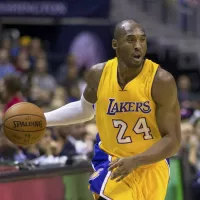
Kobe Bryant a legendary shooting guard dedicated his -year NBA...

Bernie Sanders is a prominent American politician currently serving as...
Home Box Office HBO is an American pay television service...

Adam Sandler is an American actor comedian filmmaker and musician...

Hillary Diane Rodham Clinton is a prominent American politician lawyer...
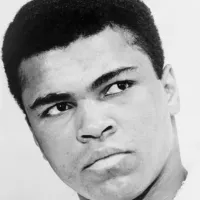
Muhammad Ali nicknamed The Greatest was an iconic American professional...
Trending

1 minute ago Jessica Pegula faces Varvara Gracheva in Dubai Tennis Championships second round.

22 hours ago Clara Tauson Faces Sofia Kenin at WTA Dubai: Predictions and Betting Odds

2 minutes ago Coco Gauff anticipates Dubai struggles, faces Kalinskaya; Alexandrova trending in WTA Dubai.
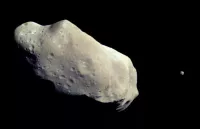
2 minutes ago NASA Warns of Undetected City-Killer Asteroids Posing Threat to Earth
2 hours ago Canada vs New Zealand T20 World Cup 2026: Thrill, Live Scores, and Game Updates.
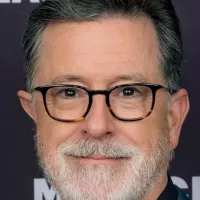
8 months ago Zohran Mamdani's success highlights Jewish divide; Israelis fear New York threat after Iran missiles.
Popular
Randall Adam Fine is an American politician a Republican who...

Pam Bondi is an American attorney lobbyist and politician currently...

Kid Rock born Robert James Ritchie is an American musician...

Barack Obama the th U S President - was the...
The Winter Olympic Games a major international multi-sport event held...

XXXTentacion born Jahseh Dwayne Ricardo Onfroy was a controversial yet...
